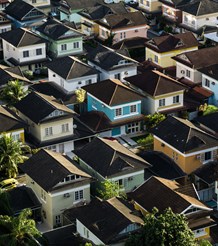
Japanese Housing Market remains upbeat despite sluggish Economy
Speaking in an interview with the publication in Tokyo, chief executive officer Karsent Kallevig of Norges Bank Real Estate Management said his institution had the capacity to complete "a couple of 100bn Yen ($912mn) deals in Japan each year if the right opportunities come along." He added that the fund hoped to own property in Japan "for a very, very long time".
The Oslo-based fund began investing in property in 2010 and since then has accumulated at least $25bn in real estate holdings by starting out firstly in Europe, then the United States and most recently in Japan. Japan's real estate market has seen a lot of foreign investment of late, as it currently offers higher yield spreads over domestic government funds than other global cities such as London or New York City, a spokesperson of Deutsche Asset Management said.
Kallevig said that coming to Tokyo was "an obvious choice" as part of setting up a global portfolio. He pointed out that, unlike Japan as a whole, the capital city's population is still increasing. Last year Japan recorded for the first time more deaths than births.
"You still have a lot of economic activity, you still have supply constraints that we typically like in most of our markets," he said.
The Norwegian sovereign wealth fund stated in December 2017 that it had bought a 70% share of a retail and office portfolio at a cost of 92.8 bn Yen. This deal was part of a joint venture with Tokyu Land Corporation, which purchased the remaining 30%. Kallevig explained that Tokyu could also be involved in future deals of this nature, without ruling out other new joint venture partners.
Kallevig said: "We’d love to do more with Tokyu Land, but we would also be very happy to do more with others. It’s hard to find one partner who has the same, let’s call it ambition, as we have."
Norges Bank opened its Tokyo real estate investment branch in 2015 but has had to be patient about finding suitable deals.
"It always takes a bit of an extra effort to do a first transaction in a new market. It took a couple of years, but I was fairly relaxed about that,” Kallevig explained.
Foreign investors contributed 1.1 tn Yen to Japanese property investment last year, three times more than in 2016, according to a report by Urban Research Institute Corp.
According to Japan Property Central, who have just published their annual report into Japanese real estate, said that transactions "hit new highs", while prices continued to rise at the same time. "The luxury residential market in Tokyo has been a star performer and developers are starting to increase their offerings of high-end apartments to cater to demand."
Japan's real estate market was supported by record numbers of foreign tourists arriving, and low office vacancy rates, improving economic conditions and low unemployment figures as well as a surging market share, the organisation reported in its annual findings for 2017.
Tokyo isn't Osaka...
According to the Global Property Guide for 2016/2017, in Tokyo, 11% more new condos came on the market in the first quarter of 2017 than in 2016. In contrast, in Osaka the market saw a 7% decline in the number of new condos coming on the market.
The Guide concluded that Japan's shrinking population was producing a "surplus of housing units". Current estimates say that the country will lose a third of its population over the next five decades. In addition, so the Global Property Guide said, about 40% of the Japanese population will be more than 65 years old by 2060.
Futoshi Ishii of the National Institute of Population and Social Security Research said at the outset of last year: "Based on our projections, the size of the annual decline will keep getting bigger before peaking somewhere between 2060 and 2070."
A rise in foreign tourist numbers would presumably soak up the surplus housing units, as investors build up their buy-to-holiday-let portfolios.

